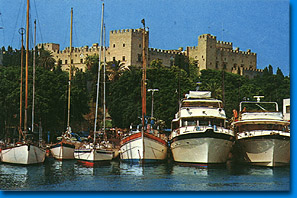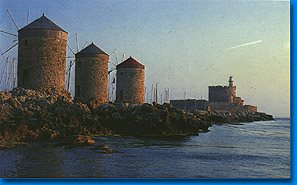 The attraction, which Rhodes has for visitors, is not due only to its natural
beauty and its individual character, but also to the very important role, which it has
played in the history of Greece. While we have the testimony of archaeological research
and the written sources, an outline of the remote past of the island can be disentangled
from a series of myths, which have been preserved down the centuries. Rhodos (Rhodes), as
we are told in one of Pindar's Odes, was the daughter of Poseidon and Amphitrite (or,
according to another version, Aphrodite) and the beloved of Helios, the sun god. When, one
day, the gods were sharing out the earth among themselves, Helios, faithful to his duties,
was away, making his daily journey round it, and so was not included in the share-out.
When he returned, Zeus, not wishing to be unjust to him, prepared to repeat the process.
But in the meantime Helios had seen an island of great beauty jutting from the depths of
the sea. This he requested should be his portion and this he chose as a suitable spot for
his union with the nymph Rhodos. Six sons, termed Heliades, were born to the couple,
together with one daughter, Electrione, who died a virgin. Helios's first-born son,
Cercaphos, himself had three sons, Lindos, Cameiros, and Ialysos. These three divided
their father's land between theln and each founded a city, which bore his name. The attraction, which Rhodes has for visitors, is not due only to its natural
beauty and its individual character, but also to the very important role, which it has
played in the history of Greece. While we have the testimony of archaeological research
and the written sources, an outline of the remote past of the island can be disentangled
from a series of myths, which have been preserved down the centuries. Rhodos (Rhodes), as
we are told in one of Pindar's Odes, was the daughter of Poseidon and Amphitrite (or,
according to another version, Aphrodite) and the beloved of Helios, the sun god. When, one
day, the gods were sharing out the earth among themselves, Helios, faithful to his duties,
was away, making his daily journey round it, and so was not included in the share-out.
When he returned, Zeus, not wishing to be unjust to him, prepared to repeat the process.
But in the meantime Helios had seen an island of great beauty jutting from the depths of
the sea. This he requested should be his portion and this he chose as a suitable spot for
his union with the nymph Rhodos. Six sons, termed Heliades, were born to the couple,
together with one daughter, Electrione, who died a virgin. Helios's first-born son,
Cercaphos, himself had three sons, Lindos, Cameiros, and Ialysos. These three divided
their father's land between theln and each founded a city, which bore his name. Another Myth
about the name of Rhodes and its earliest inhabitants relates that the Telchines, sons of
Pontus and Thalassa, first settled it. The Telchines were very skilled in the crafts of
fire and metals and in Magic. Poseidon fell in love with the sister of the Telchines,
Halia, by whom he had six sons and a daughter, Rhodos, who gave her name to the island.
One day, Aphrodite asked permission from the Telchines to put in at the island. and was
refused. In order to be revenged, the goddess put a curse on them that they should commit
incest with their mother and that the whole island should be covered with water. The
Telchines were of this by Zeus and fled in good time, leaving their sister behind. For a
long time, the plains of Rhodes were covered with water. When, however, the god Helios
fell in love with Rhodos, he bathed her in his rays and thus their warmth evaporated the
witer which covered the land. Another myth, clearly connected with the arrival of the
Minoans on Rhodes, has as its hero Althaemenes, grandson of Minos. Althaemenes, wishing to
foil an oracle which had foretold that he would kill his father, Catreus, left Crete and
settled on Rhodes, where he founded a settlement to which he gave the name of Cretenia, a
reference to his homeland. On the summit of Atavyros he build a temple to Zeus. After many
years, Catreus arrived on the island in search of his only son, but Althaemenes did not
recognise his father at a distance, and, thinking that he was a pirate killed him, thus
fulfilling the oracle. When he learnt the tragic truth, he asked that the earth would open
up and swallow him, and his wish was fulfilled. The Rhodians honoured Althaemenes, a
tragic figure in some ways reminiscent of Oedipus, as a hero. Another hero of myth,
Tlepolemos, is associated with the settling of the Dorians on RW des. He came from Tiryns,
on mainland Greece, and was the son of Heracles and Astioche. He left his home and settled
on Rhodes after Inurdering his father's uncle. The leader of the Lycians and ally of the
Trojans Sarpedon killed Tlepolemos at Troy. In his honour, the Rhodians held a festival
called the `Tlepolemia'. Another Myth
about the name of Rhodes and its earliest inhabitants relates that the Telchines, sons of
Pontus and Thalassa, first settled it. The Telchines were very skilled in the crafts of
fire and metals and in Magic. Poseidon fell in love with the sister of the Telchines,
Halia, by whom he had six sons and a daughter, Rhodos, who gave her name to the island.
One day, Aphrodite asked permission from the Telchines to put in at the island. and was
refused. In order to be revenged, the goddess put a curse on them that they should commit
incest with their mother and that the whole island should be covered with water. The
Telchines were of this by Zeus and fled in good time, leaving their sister behind. For a
long time, the plains of Rhodes were covered with water. When, however, the god Helios
fell in love with Rhodos, he bathed her in his rays and thus their warmth evaporated the
witer which covered the land. Another myth, clearly connected with the arrival of the
Minoans on Rhodes, has as its hero Althaemenes, grandson of Minos. Althaemenes, wishing to
foil an oracle which had foretold that he would kill his father, Catreus, left Crete and
settled on Rhodes, where he founded a settlement to which he gave the name of Cretenia, a
reference to his homeland. On the summit of Atavyros he build a temple to Zeus. After many
years, Catreus arrived on the island in search of his only son, but Althaemenes did not
recognise his father at a distance, and, thinking that he was a pirate killed him, thus
fulfilling the oracle. When he learnt the tragic truth, he asked that the earth would open
up and swallow him, and his wish was fulfilled. The Rhodians honoured Althaemenes, a
tragic figure in some ways reminiscent of Oedipus, as a hero. Another hero of myth,
Tlepolemos, is associated with the settling of the Dorians on RW des. He came from Tiryns,
on mainland Greece, and was the son of Heracles and Astioche. He left his home and settled
on Rhodes after Inurdering his father's uncle. The leader of the Lycians and ally of the
Trojans Sarpedon killed Tlepolemos at Troy. In his honour, the Rhodians held a festival
called the `Tlepolemia'.
Helen of Troy was also worshipped in a sanctuary on
Rhodes, under the epithet of Dendritis. Yet another myth is associated with this cult:
Helen, after the Trojan War, arrived, pursued, on Rhodes, which was then ruled by the
widow of Tlepolemos, Polyxo. As soon as Polyxo heard of this, she planned to avenge the
death of her husband, and ordered her soldiers to capture Helen and hang her from a tree (dendron),
hence the name Dendritis. Besides Althaemenes and Tlepolemos, another hero of Rhodes
was Phorbas. Tradition tells us that Rhodes was once overrun with snakes (Ancient Greek
Ophis) and was called Ophiousa. In despair, its inhabitants sought the help of the Delphic
Oracle. The Pythia replied that Phorbas, a member of the Thessalian tribe of the Lapithae,
alone could solve the problem. The Rhodians sought out Phorbas, invited him to come and
live with them, and ever afterwards honoured him as their saviour. Myth also relates that
Rhodes was visited by Danaos, with his daughters the Danaids, and that Danaos built a
temple at Lindos for the worship of Athena. Another visitor to the island, was Cadlnus,
king of Phoenicia, who was looking for his sister Europe. During his stay, he built
a temple to Poseidon and dedicated a bronze cauldron with an inscription in Phoenician
script to Athena. This is Mythology's way of explaining the introduction of the Phoenician
alphabet. |


 The attraction, which Rhodes has for visitors, is not due only to its natural
beauty and its individual character, but also to the very important role, which it has
played in the history of Greece. While we have the testimony of archaeological research
and the written sources, an outline of the remote past of the island can be disentangled
from a series of myths, which have been preserved down the centuries. Rhodos (Rhodes), as
we are told in one of Pindar's Odes, was the daughter of Poseidon and Amphitrite (or,
according to another version, Aphrodite) and the beloved of Helios, the sun god. When, one
day, the gods were sharing out the earth among themselves, Helios, faithful to his duties,
was away, making his daily journey round it, and so was not included in the share-out.
When he returned, Zeus, not wishing to be unjust to him, prepared to repeat the process.
But in the meantime Helios had seen an island of great beauty jutting from the depths of
the sea. This he requested should be his portion and this he chose as a suitable spot for
his union with the nymph Rhodos. Six sons, termed Heliades, were born to the couple,
together with one daughter, Electrione, who died a virgin. Helios's first-born son,
Cercaphos, himself had three sons, Lindos, Cameiros, and Ialysos. These three divided
their father's land between theln and each founded a city, which bore his name.
The attraction, which Rhodes has for visitors, is not due only to its natural
beauty and its individual character, but also to the very important role, which it has
played in the history of Greece. While we have the testimony of archaeological research
and the written sources, an outline of the remote past of the island can be disentangled
from a series of myths, which have been preserved down the centuries. Rhodos (Rhodes), as
we are told in one of Pindar's Odes, was the daughter of Poseidon and Amphitrite (or,
according to another version, Aphrodite) and the beloved of Helios, the sun god. When, one
day, the gods were sharing out the earth among themselves, Helios, faithful to his duties,
was away, making his daily journey round it, and so was not included in the share-out.
When he returned, Zeus, not wishing to be unjust to him, prepared to repeat the process.
But in the meantime Helios had seen an island of great beauty jutting from the depths of
the sea. This he requested should be his portion and this he chose as a suitable spot for
his union with the nymph Rhodos. Six sons, termed Heliades, were born to the couple,
together with one daughter, Electrione, who died a virgin. Helios's first-born son,
Cercaphos, himself had three sons, Lindos, Cameiros, and Ialysos. These three divided
their father's land between theln and each founded a city, which bore his name. Another Myth
about the name of Rhodes and its earliest inhabitants relates that the Telchines, sons of
Pontus and Thalassa, first settled it. The Telchines were very skilled in the crafts of
fire and metals and in Magic. Poseidon fell in love with the sister of the Telchines,
Halia, by whom he had six sons and a daughter, Rhodos, who gave her name to the island.
One day, Aphrodite asked permission from the Telchines to put in at the island. and was
refused. In order to be revenged, the goddess put a curse on them that they should commit
incest with their mother and that the whole island should be covered with water. The
Telchines were of this by Zeus and fled in good time, leaving their sister behind. For a
long time, the plains of Rhodes were covered with water. When, however, the god Helios
fell in love with Rhodos, he bathed her in his rays and thus their warmth evaporated the
witer which covered the land. Another myth, clearly connected with the arrival of the
Minoans on Rhodes, has as its hero Althaemenes, grandson of Minos. Althaemenes, wishing to
foil an oracle which had foretold that he would kill his father, Catreus, left Crete and
settled on Rhodes, where he founded a settlement to which he gave the name of Cretenia, a
reference to his homeland. On the summit of Atavyros he build a temple to Zeus. After many
years, Catreus arrived on the island in search of his only son, but Althaemenes did not
recognise his father at a distance, and, thinking that he was a pirate killed him, thus
fulfilling the oracle. When he learnt the tragic truth, he asked that the earth would open
up and swallow him, and his wish was fulfilled. The Rhodians honoured Althaemenes, a
tragic figure in some ways reminiscent of Oedipus, as a hero. Another hero of myth,
Tlepolemos, is associated with the settling of the Dorians on RW des. He came from Tiryns,
on mainland Greece, and was the son of Heracles and Astioche. He left his home and settled
on Rhodes after Inurdering his father's uncle. The leader of the Lycians and ally of the
Trojans Sarpedon killed Tlepolemos at Troy. In his honour, the Rhodians held a festival
called the `Tlepolemia'.
Another Myth
about the name of Rhodes and its earliest inhabitants relates that the Telchines, sons of
Pontus and Thalassa, first settled it. The Telchines were very skilled in the crafts of
fire and metals and in Magic. Poseidon fell in love with the sister of the Telchines,
Halia, by whom he had six sons and a daughter, Rhodos, who gave her name to the island.
One day, Aphrodite asked permission from the Telchines to put in at the island. and was
refused. In order to be revenged, the goddess put a curse on them that they should commit
incest with their mother and that the whole island should be covered with water. The
Telchines were of this by Zeus and fled in good time, leaving their sister behind. For a
long time, the plains of Rhodes were covered with water. When, however, the god Helios
fell in love with Rhodos, he bathed her in his rays and thus their warmth evaporated the
witer which covered the land. Another myth, clearly connected with the arrival of the
Minoans on Rhodes, has as its hero Althaemenes, grandson of Minos. Althaemenes, wishing to
foil an oracle which had foretold that he would kill his father, Catreus, left Crete and
settled on Rhodes, where he founded a settlement to which he gave the name of Cretenia, a
reference to his homeland. On the summit of Atavyros he build a temple to Zeus. After many
years, Catreus arrived on the island in search of his only son, but Althaemenes did not
recognise his father at a distance, and, thinking that he was a pirate killed him, thus
fulfilling the oracle. When he learnt the tragic truth, he asked that the earth would open
up and swallow him, and his wish was fulfilled. The Rhodians honoured Althaemenes, a
tragic figure in some ways reminiscent of Oedipus, as a hero. Another hero of myth,
Tlepolemos, is associated with the settling of the Dorians on RW des. He came from Tiryns,
on mainland Greece, and was the son of Heracles and Astioche. He left his home and settled
on Rhodes after Inurdering his father's uncle. The leader of the Lycians and ally of the
Trojans Sarpedon killed Tlepolemos at Troy. In his honour, the Rhodians held a festival
called the `Tlepolemia'.